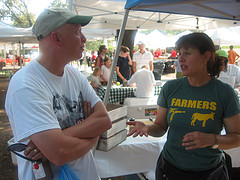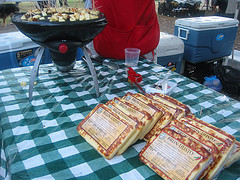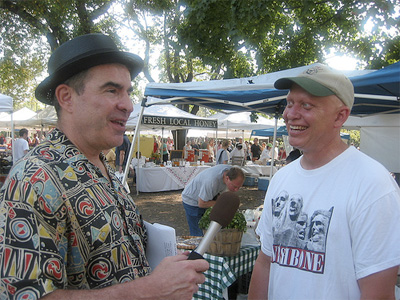| « Argo gets a New Kind of Vegan Muffin | Pinot Days - get tix now » |
Feature Tue Oct 16 2007
The Art of Artisanal Cheese
The word "artisanal" is rapidly replacing "organic," which suddenly seems so... twentieth century. Unlike the term "organic," federal regulations do not govern the use of "artisanal," though most definitions refer to "hand-made" and "small-batch," which would apply to most of the food our grandparents ate.
At Chicago's Green City Market, I talked to artisanal cheese-makers and -mongers who satisfy consumers eager for the honest flavors and pleasures of traditional cheese.
Many American artisanal cheesemakers started into operation just a few years ago. Leslie Cooperband and Wes Jarrell opened Prairie Fruits Farm outside Champaign, Illinois in 2005. Though new to the business, their old-style artisanal cheesemaking techniques recall a much earlier era, a time well before large-scale computerized cheesemaking and quick service restaurants.
Cooperband explains that "Historically, there have been numerous small cheese plants dotting the landscape in the US. Even here in Illinois, there used to be a lot more small dairies and small cheese plants."
 Jarrell believes that "Smaller cheese makers and creameries disappeared for a variety of reasons... obviously, economies of scale, fast food and people thinking cheese is cheese even if it's not made of dairy products."
Jarrell believes that "Smaller cheese makers and creameries disappeared for a variety of reasons... obviously, economies of scale, fast food and people thinking cheese is cheese even if it's not made of dairy products."
Cooperband suggests that the renewed interest in traditional artisanal gruyere, camembert and other Old World cheeses may have something to do with Americans traveling overseas and tasting the real thing ‐ and she doesn't mean Coca-Cola. "I think that the resurgence of small scale producers... has partly to do with people going to Europe and experiencing those cheeses and saying 'Why don't we have those cheeses in the US?'"
Following the French model, Cooperband crafts a fresh chevre that is preternaturally fluffy, hand-ladling Nubian and La Mancha goat milk into forms so as "not to disturb the curd." The airy cake that results is perfectly white with goatiness, extremely refined and citric notes reminiscent of lemon chiffon. Unlike larger, corporate cheesemakers that source milk from multiple dairies, Prairie Fruits Farm is home to the goats whose milk makes the cheese. Jarrell believes this relationship to the land strongly appeals to consumers: "People are so disconnected with the land. They have this empty part in their life, actually, longing to associate themselves with smaller scale and real-down-to-earth products."
 Eric Larson senses the same buying impulse from customers who visit his Marion Street Cheese Market in Oak Park. "People are longing for a connection back to farms, back to a different way of life," he says. "They love to be able to associate a face with the product that they're taking home. It makes them feel more connected to the land, it makes them feel more connected to the food."
Eric Larson senses the same buying impulse from customers who visit his Marion Street Cheese Market in Oak Park. "People are longing for a connection back to farms, back to a different way of life," he says. "They love to be able to associate a face with the product that they're taking home. It makes them feel more connected to the land, it makes them feel more connected to the food."
Maybe that's why larger cheese companies are starting to think small again. Brunkow Cheese of Wisconsin had become a commodity cheesemaker, churning out millions of curds a year. Recently, they've started a smaller scale artisanal operation, offering raw milk varieties that convey the flavors and distinct geographic personality of their homeland in Darlington, Wisconsin. James Croskey — a Brunkow employee who sells at Green City Market — explains this appeal: "The advantage of making cheese with raw milk is that they're much more flavorful, they do bring out the earthier hints and characteristics. So you taste the grass more, you taste more of the land, more of the 'terroir,' which is a wine term and means 'from the land.'"
Brunkow's Argyleshire is a raw milk cheddar, aged and cloth wrapped in the English tradition, with earthiness reflecting the pasturelands of Wisconsin's Driftless Region, where the Great Glacier never passed and the hills still roll, making it ideal for small herds. But all this flavor can be lost if the cheese is abused. "We don't cryovac any of our cheeses," Cooperband explains. "The French say that cheese is a living thing, and to entomb it in plastic is like suffocating your first born. Marion Street and Pastoral — when they wrap a cheese, they don't wrap it in plastic."

Cheesemongers like Larson take care to maintain each cheese's hand-crafted character because consumers are now looking for that individual personality in the food they eat: "The challenges of bringing cheese to market are unique. It is still a living product. In the last year or so especially, we see consumers having much greater awareness of who produces their food and we find them seeking out foods that are locally produced."
Joel Smith is the Regional Governor for Slow Food, the international movement based in Italy that works to reconnect consumers and producers. Their motto is "Taste, Tradition, and the Honest Pleasures of Food." Smith believes that good eating can and should be a very personal pursuit.
"By knowing your farmer, or directly where your food supply comes from, you begin to create a whole series of ripple effects from that one act that are beneficial to you, the pleasure that you're getting from it." he says. "Carlo Petrini of Slow Food says that there are only two things that are absolutely necessary for our species to survive, and both of them should be as pleasurable as possible. We have fractured the dining experience in America — pulling away from the drive-in window with the wrappers in their lap... it's not pleasurable. You should take pleasure in what the seasons give you and what artisanal producers give you. Don't eat anything that your grandmother would not recognize as food."
This article also ran on Chicago Public Radio's "Eight Forty-Eight" program on Oct. 15, 2007.








